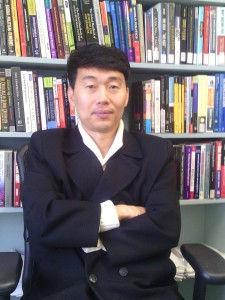By Tung Nguyen, Online Editor
The world, in the last 10 years, has witnessed the rise of China, which raises the question of whether
that country will challenge the hegemony of the United States.
Ji Young Choi, an Ohio Wesleyan University associate professor of international politics, addressed
the unstoppable growth of China in regard to its relationship with the United States at Friday’s Great
Decisions community series about foreign policy.
Global pundits have laid out three primary concerns about China’s ambition in which it wants to
preserve the current status quo: it wants to strive for the global hegemony but yet has no capabilities;
or it has all the resources to overthrow the reign of the United States.
“Personally, I agree more with the last scenario,” Choi said. “There are many signs that reveal China’s
willingness to change the existing order.”
Recently, China invested in and constantly increased its military budget. Even though border conflicts
remain a concern for China, there is no direct security threat serious enough to worry President Xi
Jinping. The development and purchase a massive amount of submarines, aircraft carriers and
battleships by China in the last five years have clearly raised many eyebrows, Choi said.
“Besides the popular thought of many experts that China wants to show her strong willingness for an
overturn,” Choi said. “China also wants to maintain her military superiority in the Asia-Pacific region for
further planning.”
On the other hand, China’s economic growth in the last 12 years has been both strong and stable
compared to other global superpowers, It’s GDP growth rate is 6 percent.
With such enhancements on hard power, China also joined, as well as created, international
organizations to legitimize herself as a rising challenger to the United States.
“China, besides cooperating with other major superpowers in BRICS [Brazil, Russia, India, China and
South Afrtica] also operated Asian Infrastructure Investment Bank (AIIB) to expand her trade network or
influences,” Choi said. “For the record, many of the United States’ allies such as Germany, France and
the United Kingdom, became the members of AIIB.”
After the lecture, Dave Staats said, “I thought it was a very strong and sobering presentation
regarding to the recent trade wars between China and the United States. I also agree with Prof. Choi
that China clearly has the capabilities to challenge the global order with the United States.”
Along with the South China Sea disputes and conflicts with Taiwan in terms of the One China policy,
China also plays a big part behind the denuclearization process between the United States and North
Korea.
“Even though the relationship between China and North Korea became cold recently,” Choi said, “I
think that President Xi Jinping will likely side with North Korea in this matter because the collapse of
North Korea will definitely harm the well-being of China in some ways.”
Teresa Staats, besides agreeing with her husband, said, “The most dramatic thing I took from the
presentation is the relationship between the United States and North Korea and also what Prof. Choi
said about the goals of China pertaining to North Korea.”
Asked about the possibility of President Donald Trump using nuclear weapons to deal with North Korea,
Choi responded, “I do not think that he will push the button because after all, he is still a smart man in a
sense.”
